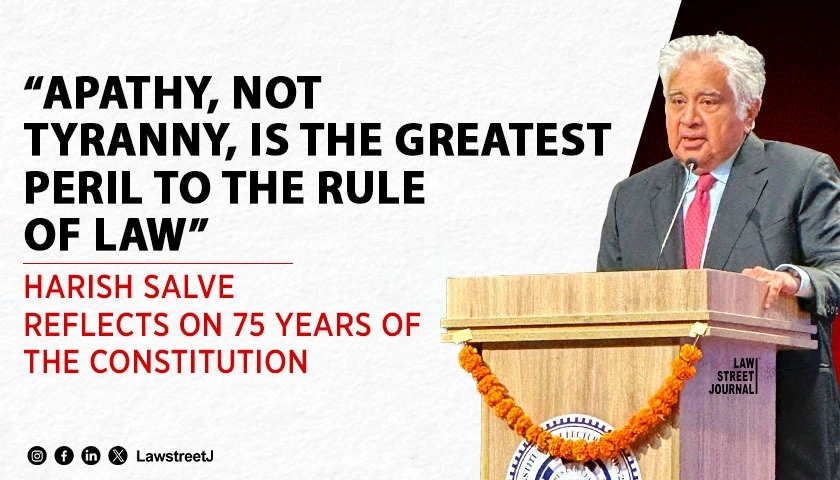New Delhi: Mr. Harish Salve, King’s Counsel and Senior Advocate, delivered a profoundly reflective and critical yet celebratory address at the 19th Kartavyam Series lecture at Sri Ram College of Commerce, University of Delhi — a series that has been “discussed in Parliament and recognized by the Government of India.”
Described as a jurist whose work has left “an indelible print on the legal and moral fabric of our nation” and internationally known for representing India at the International Court of Justice in the Kulbhushan Jadhav case for “just one rupee,” Mr. Salve opened his lecture noting that the moment called for “stock taking our successes and shortcomings,” saying he had come to “account for what my generation has done.” Emphasizing lifelong learning, he reminded students, “The day you stop being a student, that’s the day you stop growing. That’s the day you start growing old.”
He praised the current generation’s commitment to “embrace decolonization,” remarking that “wisdom is not the preserve of the West.” Quoting his late guru, he added, “What we need is buddhi — and that is what we are proudly embracing today.”
Highlighting that India has built resilient institutions that have “survived the ravages of time,” Mr. Salve noted the strength of the Parliament, the Executive, and the Judiciary. He reflected on governance evolving from “opaque” to “transparent,” remarking that today’s generation “takes the right to information for granted.” Applauding India’s democratic journey, he said, “India is the only country which has changed again and again the government with the ballot, not the bullet.”
However, the heart of his lecture centered around challenges to the rule of law and the reforms required to strengthen constitutional governance. Calling the rule of law the “soul of a democratic republic,” he asserted that its ultimate guardian is not the judiciary but the citizens: “The ultimate savior of the rule of law is Indian sovereignty.” Recalling the “phony emergency of 1975,” he criticized the Supreme Court’s capitulation in the Shiv Kant Shukla case, while also commending the later development of fundamental rights jurisprudence, especially the “complete domination of the principle of non-arbitrariness” ensuring there is “no space for whim, hubris, or arbitrariness.”
Mr. Salve disagreed with the inclusion of Fundamental Duties in the Constitution, calling them “unnecessary,” asserting that “Fundamental rights are also fundamental duties.” He strongly advocated for a Civil Rights Act, arguing that enforcement of fundamental rights “shouldn’t be the privilege of the Supreme Court and those who can reach it.” Citizens, he said, must be empowered to seek redressal locally: “A citizen should be compensated, or a policeman penalized for wrongful arrest in a magistrate’s court.”
On judicial appointments — his “pet peeve” — he reflected that the system adopted after fighting “complete executive domination” in 1991 was only “a band-aid, not a solution.” Citing C.S. Lewis, he remarked that to correct a wrong road, one must turn back, adding: “If as 1.4 billion Indians we can’t find seven honest people to appoint judges, shame on us in calling ourselves a democracy.” Cautioning against judicial overreach, he referenced Justice Antonin Scalia’s term “judicial oligarchy,” warning against a judiciary becoming “sovereign and supreme” over other branches. Critiquing the expanding use of Article 142 as a license “to do whatever you think is right,” he cautioned that a “judicial nudge” must not turn into a “judicial sledgehammer.”
Speaking on transparency in governance, Mr. Salve warned against equating transparency with voyeurism. “Public curiosity gratifies not public interest — it gratifies public curiosity.” On information, which he called “the new oil or the new gold,” he quoted Hannah Arendt: “The ideal subject of totalitarian rule is not the convinced Nazi or the convinced communist, but people for whom the distinction between fact and fiction no longer exists.” He warned that “tyrants are created on fake news and false narratives.”
Addressing students, he urged them to “embrace globalization,” assuring that it “is the best thing which will happen to you,” particularly for a nation “hungry to grow.” During the Q&A, he acknowledged that PILs have “definitely improved access to justice,” but lamented their weaponization “to enforce accountability on co-equal institutions.” He warned of judicial delays, stating, “Justice delayed is justice not just denied — justice barred.”
Concluding, Mr. Salve warned: “The greatest peril to the rule of law lies not in tyranny but in apathy.” He closed with his guru’s wisdom: “Democracy is a ceaseless endeavor. It is not a safe harbor.”
OfficialMedia Partner: LawStreet Journal













